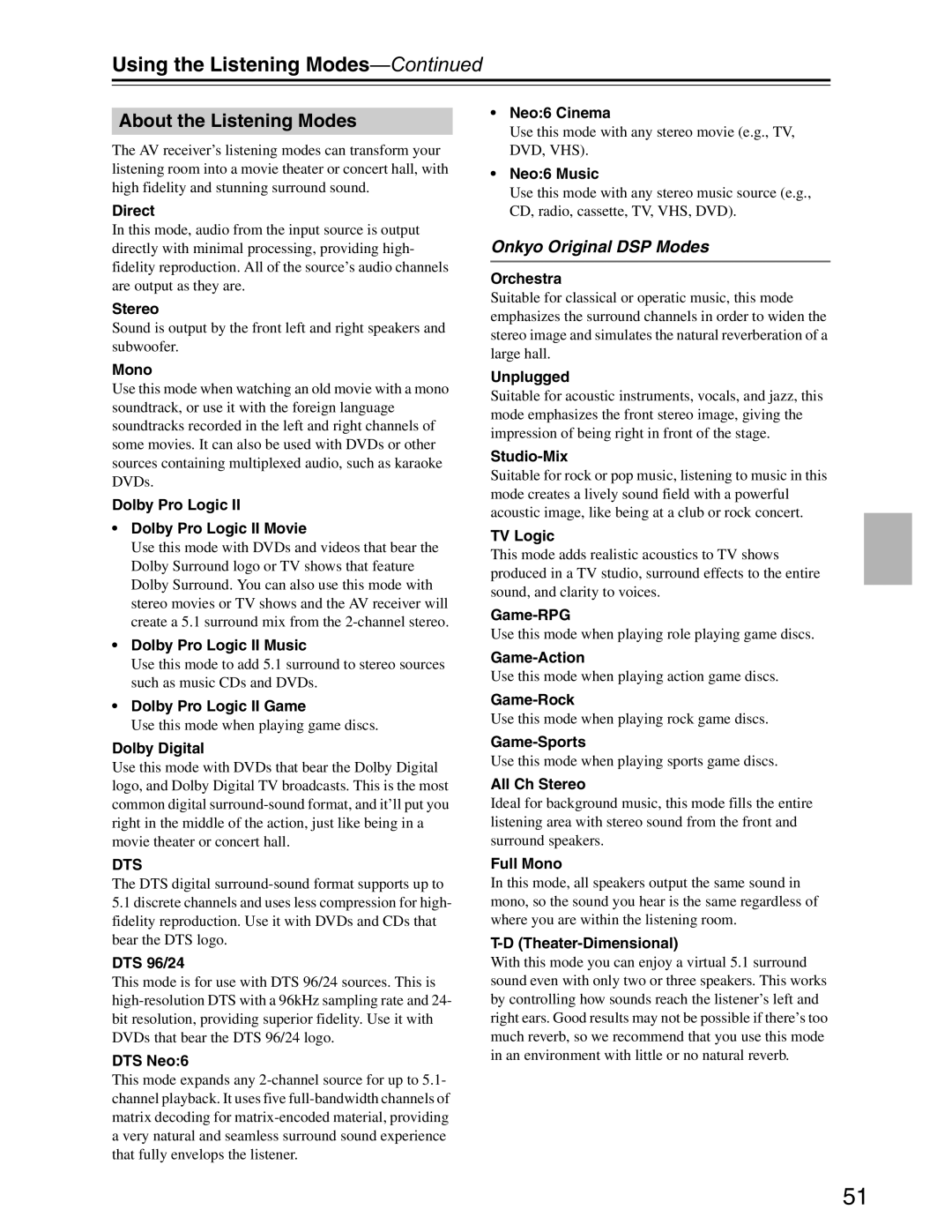
Using the Listening Modes—Continued
About the Listening Modes
The AV receiver’s listening modes can transform your listening room into a movie theater or concert hall, with high fidelity and stunning surround sound.
Direct
In this mode, audio from the input source is output directly with minimal processing, providing high- fidelity reproduction. All of the source’s audio channels are output as they are.
Stereo
Sound is output by the front left and right speakers and subwoofer.
Mono
Use this mode when watching an old movie with a mono soundtrack, or use it with the foreign language soundtracks recorded in the left and right channels of some movies. It can also be used with DVDs or other sources containing multiplexed audio, such as karaoke DVDs.
Dolby Pro Logic II
•Dolby Pro Logic II Movie
Use this mode with DVDs and videos that bear the Dolby Surround logo or TV shows that feature Dolby Surround. You can also use this mode with stereo movies or TV shows and the AV receiver will create a 5.1 surround mix from the
•Dolby Pro Logic II Music
Use this mode to add 5.1 surround to stereo sources such as music CDs and DVDs.
•Dolby Pro Logic II Game
Use this mode when playing game discs.
Dolby Digital
Use this mode with DVDs that bear the Dolby Digital logo, and Dolby Digital TV broadcasts. This is the most common digital
DTS
The DTS digital
5.1discrete channels and uses less compression for high- fidelity reproduction. Use it with DVDs and CDs that bear the DTS logo.
DTS 96/24
This mode is for use with DTS 96/24 sources. This is
DTS Neo:6
This mode expands any
•Neo:6 Cinema
Use this mode with any stereo movie (e.g., TV, DVD, VHS).
•Neo:6 Music
Use this mode with any stereo music source (e.g., CD, radio, cassette, TV, VHS, DVD).
Onkyo Original DSP Modes
Orchestra
Suitable for classical or operatic music, this mode emphasizes the surround channels in order to widen the stereo image and simulates the natural reverberation of a large hall.
Unplugged
Suitable for acoustic instruments, vocals, and jazz, this mode emphasizes the front stereo image, giving the impression of being right in front of the stage.
Studio-Mix
Suitable for rock or pop music, listening to music in this mode creates a lively sound field with a powerful acoustic image, like being at a club or rock concert.
TV Logic
This mode adds realistic acoustics to TV shows produced in a TV studio, surround effects to the entire sound, and clarity to voices.
Use this mode when playing role playing game discs.
Use this mode when playing action game discs.
Use this mode when playing rock game discs.
Use this mode when playing sports game discs.
All Ch Stereo
Ideal for background music, this mode fills the entire listening area with stereo sound from the front and surround speakers.
Full Mono
In this mode, all speakers output the same sound in mono, so the sound you hear is the same regardless of where you are within the listening room.
T-D (Theater-Dimensional)
With this mode you can enjoy a virtual 5.1 surround sound even with only two or three speakers. This works by controlling how sounds reach the listener’s left and right ears. Good results may not be possible if there’s too much reverb, so we recommend that you use this mode in an environment with little or no natural reverb.
51
